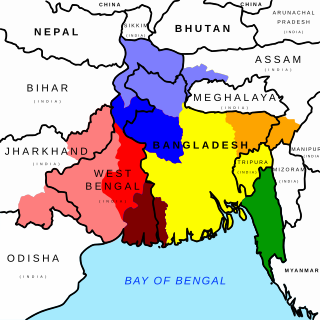
Bengali music comprises a long tradition of religious and secular song-writing over a period of almost a millennium. Composed with lyrics in the Bengali language, Bengali music spans a wide variety of styles.

Kabir Suman is an Bengali Muslim singer-songwriter, musician, music director, music composer, writer, actor, politician, and former journalist lives in the Indian state of West Bengal He shot to fame in the 1990s with Bengali albums such as Tomake Chai and Boshe Anko (Sit-and-Draw). Suman has won a National Film Award for Best Music Direction for his work in Jaatishwar (2014).

Pankaj Kumar Mullick was an Indian music composer, playback singer and actor, who was a pioneer of film music in Bengali cinema and Hindi cinema at the advent of playback singing, as well as an early exponent of Rabindra Sangeet.
Mukherjee, also Mukerjee, Mookerjea, Mookerjee, Mukerji, Mukherji, Mukhujje or Mookherjee, is a Bengali Hindu Kulin Brahmin surname originating from the Bengal region of the Indian subcontinent. The traditional Bengali version is Mukhopaddhae, which is sometimes written Mukhopadhyay.
Calcutta Youth Choir was set up in 1958 by Ruma Guha Thakurta with Salil Chowdhury and Satyajit Ray.

Subhash Mukhopadhyay was one of the foremost Indian Bengali poets of the 20th century. He is also known as the "podatik kobi" in the field of Bengali literature. A book of thirty of Subhash's best known poems in English translation, titled ' As Day is Breaking', was published in 2014 by Anjan Basu, a Bangalore-based writer/critic. The book includes a rather detailed introduction to the poet's work as well. He was honoured with Jnanpith Award in 1991.
Kumud Ranjan Mullick (1883–1970) was a Bengali writer and poet. He was a poet of the Tagore era of Bengali literature. He was an early mentor and coach to the poet Kazi Nazrul Islam.

Swastika Mukherjee is an Indian actress who mainly appears in Bengali and Hindi films and television. She is the daughter of actor Santu Mukhopadhyay. Throughout her career, she received various accolades including four Filmfare Awards East, one WBFJA, one Anandalok Award and one Kalakar Award.
Shyamal Mitra was an Indian versatile playback singer and music director along with Hemanta Mukherjee and Manna Dey. Mitra had also worked in many Hindi and Bengali films as a music director and film producer. He was the most notable musician of the golden era of Bengali music industry. His baritone voice reflected a range of emotions. Besides recording a huge number of popular Bengali basic songs, he also worked as a playback singer in more than a hundred Bengali films and directed music in more than fifty Bengali films. He also sang in various other Indian languages, like Hindi, Assamese, and Oriya.
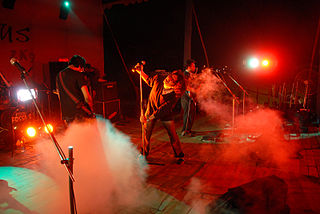
Fossils (ফসিল্স) is an Indian hard rock band from Bengal formed in Kolkata, West Bengal, India, in 1998. The group is considered one of the pioneering rock acts in Kolkata's Bengali music scene. The band currently comprises Rupam Islam, Deep Ghosh, Allan Temjen Ao, Tanmoy Das (drums), Prasenjit 'Pom' Chakraborty.
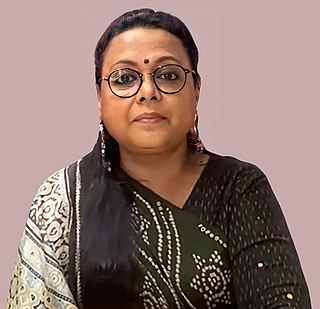
Lopamudra Mitra is an Indian Bengali-language singer who started the trend of singing " Kobitar Gaan" or music set to poems. She is a doyen in this genre. Her most notable Kobitar Gaan, or poem set to tune, is Benimadhob by Joy Goswami. She is a popular singer in other genres like Folk, Modern Bengali Songs, and Rabindra sangeet.
Mahishasuramarddini is a widely popular early Bengali special dawn radio programme that has been broadcasting since 1931 on All India Radio (AIR) in Indian state West Bengal. Due to its increasing popularity, now-a-days it is also broadcast by many other stations of All India Radio across India. It is a one-and-a-half-hour audio montage of Chaṇḍipāaṭh recitation from the scriptural verses of Śrī Śrī Chaṇḍi or Durga Saptashati, Bengali devotional songs, classical music and a dash of acoustic melodrama. The program has been translated into Hindi set to similar orchestration and is broadcast at the same time for a pan-Indian audience. This programme is aired every year at day-break on Mahalaya. The programme, which started off as a live-performance, has been broadcast in its pre-recorded format since 1966. However, its great popularity remains undiminished even today over 93 years later.
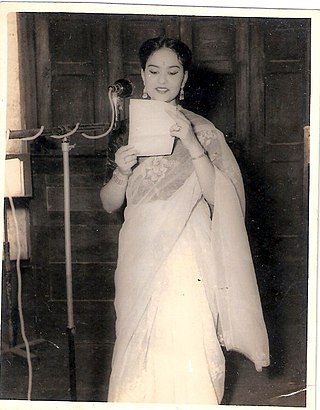
Alpana Mukherjee was a successful Bengali singer during the late 1940s and 1950s and onwards. Her most noted songs are "Trader Chumki Jole Akashe" "Hatti Matim Tim", "Mon Bolchhe Aaj Sandhyay", "Chotto Pakhi Chandana" and "Ami Alpana Enke Jai Aloy Chhayay" " Akash Ar Eai Mati Oi Dure" " Jodi Oli Na chahe".
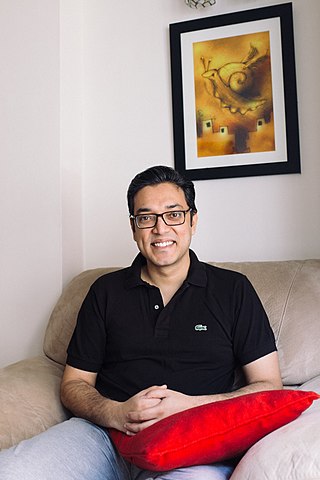
Anupam Roy is an Indian singer-songwriter, music director, composer, songwriter, guitarist, playback singer, engineer from Kolkata, India. He made his debut with Amake Amar Moto Thakte Dao & Benche Thakar Gaan, which appeared on the soundtrack of the 2010 Bengali film Autograph. Since then, he has gone on to compose, write lyrics and sing for many Bengali films.

Sudhin Dasgupta was a prolific Bengali music director, lyricist and singer. He worked in various other Indian languages, such as Hindi, Assamese and Oriya. His contribution opened a new horizon to the Bengali music for both the arenas of Bengali basic song as well as Bengali film song.

Himangshu Dutta was a Bengali music director. Amongst several contemporary legendary composers of his time as Rabindranath Tagore, Kazi Nazrul Islam, and Atulprasad Sen, Dutta is renowned for his unique and melodious composition of music. Songs composed by him is usually known as "Himangshu Dutta-er Gaan". The Saraswat Samaj of Dhaka awarded him the title 'Surasagar' for his contribution to Bengali music. He himself was an accomplished singer as well.

Arunendu Das was a Burmese born Bengali architect, singer-songwriter and musician. He was one of the pioneers of late 20th-century alternative Bengali songwriting. While Moheener Ghoraguli is considered to be the first Bengali Band, Arunendu was the first person to compose Bengali lyrics for songs written specifically to be accompanied by guitar, a genus of Bengali music which has become increasingly popular over time.

Rupankar Bagchi, also known mononymously Rupankar, is a Bengali singer-songwriter, playback singer and actor from Kolkata, India.
Anirban Bhattacharya is an Indian actor, theatre actor, singer and director. His first successful theatre production was Debi Sarpamasta, written by Manoj Mitra, directed by Debesh Chattopadhyay. His other notable works are Anthony Soudamini, Nagamandala, Jara Agun Lagay, Bisorjan, FM Mahanagar, Karu Basana, Awdyo Shesh Rajani, Athoi etc. In 2017, he got the Mahindra Excellence Theatre Awards (META) as Best Actor in a Leading Role (Male) for Awdyo Shesh Rajani.
Ami Banglay Gaan Gai is a patriotic song by Bengali poet and composer and singer Pratul Mukhopadhyay. The song was elected as sixth greatest Bengali song of all time by BBC Bangla. This song also has been sung in a popular action Bharatio Bangla Cinema 'Kranti' acting by popular actor Jeet.













